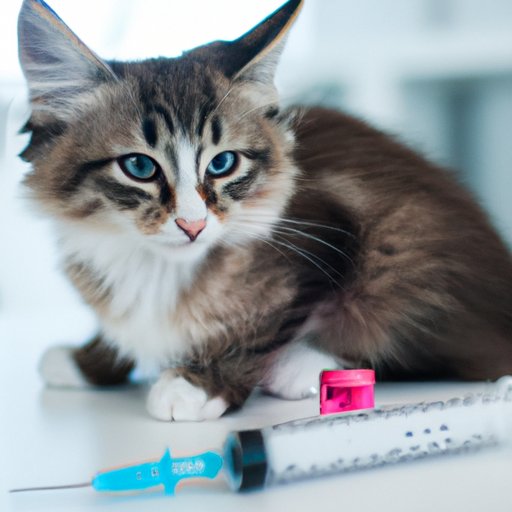Introduction
If you’ve recently adopted an indoor kitten, one of the most important things you can do to ensure their health and safety is to make sure they are properly vaccinated. Vaccines are essential for protecting cats from serious illnesses and diseases, and understanding which shots your indoor kitten needs is key to providing them with the best care possible.
What to Expect When Taking Your Kitten for Its Shots
Before taking your kitten for their vaccinations, it’s important to be prepared. Make sure you have the contact information for your vet and any paperwork that may be required for the appointment. You should also bring a list of any questions or concerns you have about the shots your cat will need.
At the appointment, your vet will likely give your kitten a physical exam and discuss the type of vaccines they will need. The type of shot will depend on several factors such as the age of the kitten, their overall health, and the risk of exposure to certain diseases in your area. Common vaccines for kittens include distemper, feline leukemia, and rabies.
The cost of the vaccinations will vary depending on the type of vaccine and the number of doses needed. Some vaccines need to be administered in multiple doses over a period of time, while others may only need to be given once. Talk to your vet about payment options and whether or not the vaccinations are covered by your pet insurance plan.

Exploring the Benefits of Vaccinating an Indoor Kitten
Vaccinating your indoor kitten offers several important benefits. The most important is protection from serious diseases. Vaccines help protect your cat from illnesses like distemper, feline leukemia, and rabies, which can be fatal if left untreated. Vaccines also help keep other cats in your household safe from these diseases, as well as cats in your local community.
In addition to protecting your kitten from disease, vaccination can also lead to better overall health and a longer lifespan. Studies have shown that cats who are regularly vaccinated live longer and healthier lives than cats who are not vaccinated. This is because they are less likely to become ill and more likely to receive early medical treatment if they do become sick.
How Often Should You Vaccinate an Indoor Kitten?
The frequency of vaccinations for an indoor kitten will depend on the type of vaccine and the age of the kitten. Most kittens will need to be vaccinated every three to four weeks until they reach 16 weeks of age. After that, booster shots will be needed at least once a year to maintain immunity.
It’s important to talk to your vet about the specific vaccination schedule for your kitten. They will be able to provide guidance on when and how often your kitten should be vaccinated. It’s also important to keep up to date on booster shots and other vaccinations to ensure your kitten remains protected from serious illnesses.

The Risks of Not Vaccinating an Indoor Kitten
Not vaccinating your indoor kitten can put them at risk of serious illnesses and diseases. Without the protection of vaccines, your kitten could be exposed to preventable diseases like distemper, feline leukemia, and rabies. These illnesses can cause severe symptoms and even death if left untreated.
In addition, not vaccinating your kitten can also increase their risk of developing other health issues. Unvaccinated cats are more likely to suffer from infections, skin problems, and other medical conditions. These issues can be expensive to treat and can cause long-term health problems for your kitten.

Debunking Myths About Vaccinating Indoor Kittens
Despite the clear benefits of vaccinating your indoor kitten, there are still some myths about the safety of vaccines. One common myth is that vaccines are unsafe and can cause serious side effects. However, studies have shown that the risk of serious side effects from vaccines is extremely low. Additionally, the risk of serious illnesses like distemper, feline leukemia, and rabies is much higher than the risk of side effects from vaccines.
Another myth is that vaccines are unnecessary for indoor cats, since they are not exposed to the same risks as outdoor cats. This is not true. Even if your cat never leaves the house, they can still come into contact with diseases carried by other animals or people. Vaccines are the best way to protect your kitten from these risks.
Conclusion
Vaccinating your indoor kitten is essential for protecting them from serious illnesses and diseases. Understanding which shots your kitten needs and how often they should be vaccinated is key to providing them with the best care possible. Talk to your vet about the type of vaccines your kitten needs and the frequency of vaccinations to ensure they remain healthy and protected.


